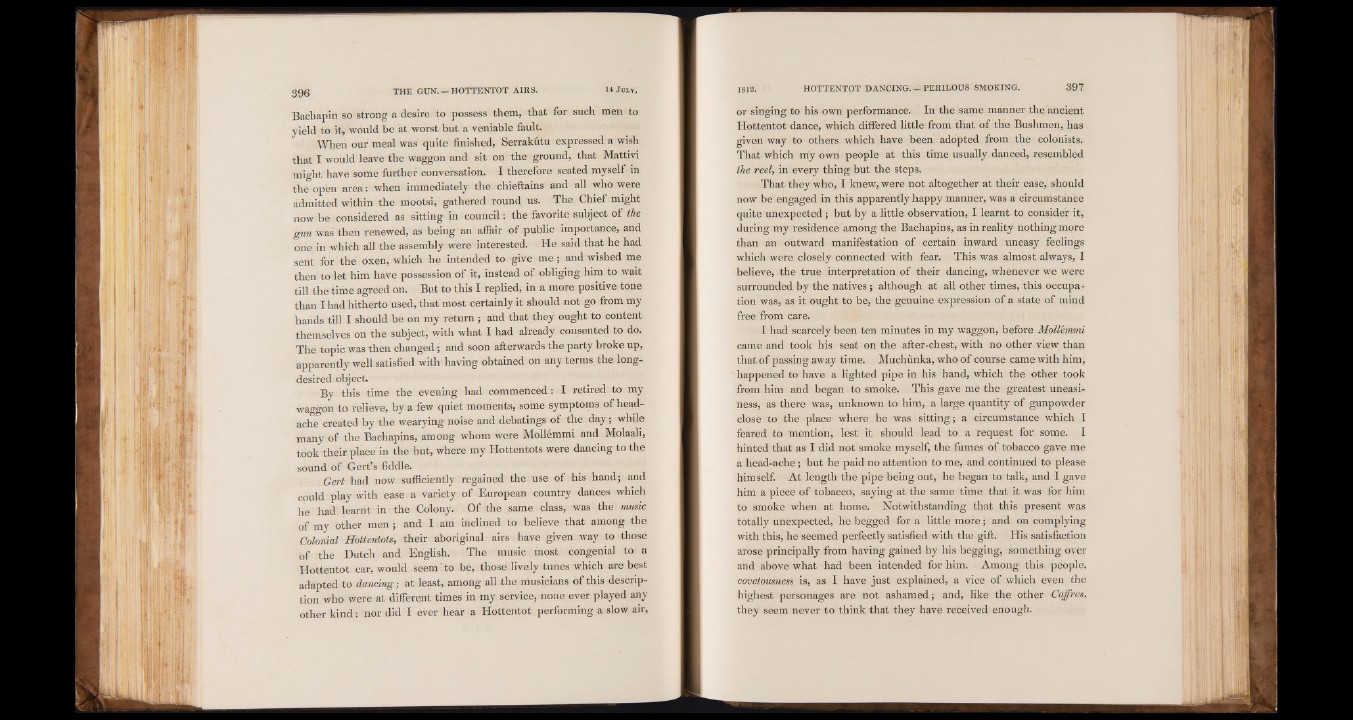
Bachapin so strong a desire to possess them, that for such men to
yield to it, would be at worst but a veniable fault.
When our meal was quite finished, Serrakútu expressed a wish
that I would leave the waggon and sit on the ground, that Mattivi
might have some further conversation. I therefore seated myself in
the open area: when immediately the chieftains and all who were
admitted within the mootsi, gathered round us. The Chief might
now be considered as sitting in council: the favorite subject of the
gun was then renewed, as being an affair of public importance, and
one in which all the assembly were interested. He said that lie had
sent for the oxen, which he intended to give m e; and wished me
then to let him have possession of it, instead of obliging him to wait
till the time agreed on. But to this I replied, in a more positive tone
than I had hitherto used, that most certainly it should not go from my
hands till I should be on my return ; and that they ought to content
themselves on the subject, with what I had already consented to do.
The topic was then changed; and soon afterwards the party broke up,
apparently well satisfied with having obtained on any terms the long-
desired object.
By this time the evening had commenced: I retired to my
waggon to relieve, by a few quiet moments, some symptoms of headache
created by the wearying noise and debatings of the day; while
many of the Bachapins, among whom were Mollémmi and Molaali,
took their place in the hut, where my Hottentots were dancing to the
sound of Gert’s fiddle.
¿rerf'had now sufficiently regained the use of his hand; and
c o u ld play with ease a variety of European country dances which
he had learnt in the Colony. Of the same class, was the music
of my other men ; and I am inclined to believe that among the
Colonial Hottentots, their aboriginal airs have given: way to those
of the Dutch and English. The music most congenial to a
Hottentot ear, would seem " to be, those lively tunes which are best
adapted to dancing i at least, among all the musicians of this description
who were at different times in my service, none ever played any
other kind: nor did I ever hear a Hottentot performing a slow air,
or singing to his own performance. In the same manner the ancient
Hottentot dance, which differed little from that of the Bushmen, has
given way to others which have been adopted from the colonists.
That which my own people at this time usually danced, resembled
the reel, in every thing but the steps.
That they who, I knew, were not altogether at their ease, should
now be engaged in this apparently happy manner, was a circumstance
quite unexpected; but by a little observation, I learnt to consider it,
during my residence among the Bachapins, as in reality nothing more
than an outward manifestation of certain inward uneasy feelings
which were closely connected with fear. This was almost always, I
believe, the true interpretation of their dancing, whenever we were
surrounded by the natives; although at all other times, this occupation
was, as it ought to be, the genuine expression of a state of mind
free from care.
I had scarcely been ten minutes in my waggon, before Moll'emmi
came and took his seat on the after-chest, with no other view than
that of passing away time. Muchunka, who of course came with him,
happened to have a lighted pipe in his hand, which the other took
from him and began to smoke. This gave me the greatest uneasiness,
as there was, unknown to him, a large quantity of gunpowder
close to the place where he was sitting; a circumstance which I
feared to mention, lest it should lead to a request for some. I
hinted that as I did not smoke myself, the fumes of tobacco gave me
a head-ache; but he paid no attention to me, and continued to please
himself. At length the pipe being out, he began to talk, and I gave
him a piece of tobacco, saying at the same time that it was for him
to smoke when at home. Notwithstanding that this present was
totally unexpected, he begged for a little more; and on complying
with this, he seemed perfectly satisfied with the gift. His satisfaction
arose principally from having gained by his begging, something over
and above what had been intended for him. Among this people,
covetousness is, as I have just explained, a vice of which even the
highest personages are not ashamed; and, like the other Caffres,
they seem never to think that they have received enough.